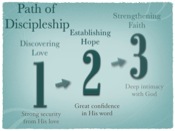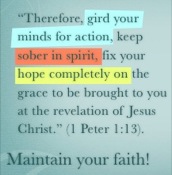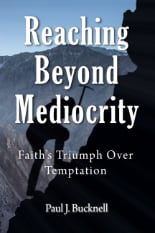

Discovering Choices: Lesson #2
Discipleship Level 2: Reaching Beyond Mediocrity
Paul J. Bucknell
Choices | Battlefield | Evaluation | Path of Life | 3 Choices
![]()
Purpose: Why do believers end up with mediocre and dull lives rather than Christ-filled lives? You will begin to see the reason for this in Discovering Choices, the first part in the second lesson of Discipleship 2: Reaching Beyond Mediocrity series. Learn how our choices are related to our hope and confidence. This is a foundational lesson that leads to significant improvement in our lives.
Discovering Choices
Our spiritual life can be helpfully divided into three stages.  Stage #1 is Discovering Love, Stage #2 is Establishing Hope, that is our present Level 2 series, and Stage #3, Strengthening Faith. There is some overlapping between the stages. Our faith, love and joy is growing in each stage, but each stage has its particular emphasis of training and development. Level 2's emphasis is Establishing Hope by gaining confidence of His powerful Word.
Stage #1 is Discovering Love, Stage #2 is Establishing Hope, that is our present Level 2 series, and Stage #3, Strengthening Faith. There is some overlapping between the stages. Our faith, love and joy is growing in each stage, but each stage has its particular emphasis of training and development. Level 2's emphasis is Establishing Hope by gaining confidence of His powerful Word.
We ended our first session by giving two assignments.  The first exercise from Psalm 119 trained us to detect hope. (We will comment later on the self-evaluation.) It is vital that we are able to spot hope or its opposite, a spirit of giving up. Our ability to grow in this stage is dependent upon our ability to detect hope and faith. You will see the reason for this as we progress through this lesson.
The first exercise from Psalm 119 trained us to detect hope. (We will comment later on the self-evaluation.) It is vital that we are able to spot hope or its opposite, a spirit of giving up. Our ability to grow in this stage is dependent upon our ability to detect hope and faith. You will see the reason for this as we progress through this lesson.
Hope is largely missing from our society. We can observe that through the statistics of the number of depressed people. Major depression (MDD), that depression which affects one's normal functions, annually affects 14.8 million American adults. This does not include mild depression which would be a much greater number. Serious disappointment yet affects even a larger group of individuals.
Peter uses the word hope three times in chapter one of 1 Peter.
The source of our hope
"Blessed be the God and Father of our Lord Jesus Christ, who according to His great mercy has caused us to be born again to a living hope through the resurrection of Jesus Christ from the dead" (1 Peter 1:3).
The means to maintain hope
"Therefore, gird your minds for action, keep sober in spirit, fix your hope completely on the grace to be brought to you at the revelation of Jesus Christ" (1 Peter 1:13).
The focus of our hope
"Who through Him are believers in God, who raised Him from the dead and gave Him glory, so that your faith and hope are in God" (1 Peter 1:21).
When we worked through the verses of Psalm 119, we discovered the vitality to the Psalmist's life. He was filled with hope. As we detected his hope in each verse, could you also find times when you had or did not have that same hope?
 We need to guard our hope and faith. In 1 Peter 1:13 he tells us three things to do in order to maintain the vibrancy of our faith:
We need to guard our hope and faith. In 1 Peter 1:13 he tells us three things to do in order to maintain the vibrancy of our faith:
- Ready our minds for action,
- Keep a sober judgment about life (attitude or approach) and
- Fix our hope completely on Christ's grace.
Each of these things have to do with those things which are not seen with our eyes. Interestingly, this is where the battle occurs.
Hope is critical to bringing change to people's lives. By it people are motivated to do something that previously they might have thought impossible. Hope and faith are related. "Now faith is the assurance of things hoped for, the conviction of things not seen." (Hebrews 11:1). They are inseparable. Hope is the aspiration while faith is the conviction of its accomplishment.
As we continue on, it is important to keep in mind what we have learned about hope. We will begin to build upon what we have learned here in these following lessons.
Our objective is to enable each Christian to learn how to properly handle the Word of God so that he might be able to overcome any kind of problem that he encounters. We can only rightly handle God's Word through faith. We will only rely on God's truth if we believe there is positive hope for change through it. God wants each of us to succeed. This increasing sense of confidence arises from a previous victory.
-> Continue on reading part 2/6: Victory on the Battlefield
Reaching Beyond Mediocrity (Click here)
Discipleship at the 2nd level
by Paul J. Bucknell
God's Word comes alive as you learn how to use it to overcome personal struggles like anxiety, depression, pride, lust and anger. God has made you strong! Many worksheets! (300+ pages). This is the full resource with all the complete and updated pages included!
info@foundationsforfreedom.net
Scriptures typically quoted from the New American Standard Bible unless noted:
(C) Copyright The Lockman Foundation 1988










